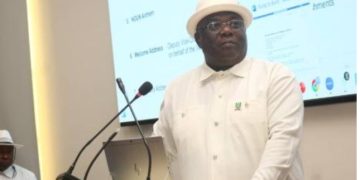The Tertiary Education Trust Fund (TETFund) said it received ₦1.6 trillion for various interventions across tertiary institutions in the country.
Chairman of TETFund’s Governing Board and former Katsina State governor, Aminu Masari, disclosed this on Sunday during an interview with journalists in Katsina.
He said the fund, the highest in recent allocations, was accrued from the three per cent education tax imposed on company profits, as stipulated by the TETFund Act.
Mr Masari stated that 40 per cent of the amount, representing ₦460 billion, was earmarked for interventions across tertiary institutions nationwide.
For state-level interventions, three institutions were selected in each state – one university, one polytechnic and one College of Education – to benefit.
He stated, “The interventions are demand-driven. Institutions write to us, and we approve projects for them based on their needs and available resources.’’
Mr Masari said ₦225 billion from the ₦1.6 trillion was released to the Nigerian Education Loan Fund (NELFUND) for the Federal Government’s students’ loan scheme.
He noted that another ₦70 billion was earmarked as energy support for tertiary institutions to build solar or gas power generation facilities.
The board also allocated ₦25 billion to assist some institutions in enhancing campus security.
“The institutions will use the funds for security-related projects, such as installing streetlights and similar facilities,” Mr Masari said.
According to him, TETFund has spent over ₦100 billion to strengthen medical sciences training across tertiary institutions in Nigeria.
He said the funds were to improve the capacity of institutions to train students in medical sciences, boosting manpower in the healthcare sector.
Mr Masari stressed that the interventions aligned with President Bola Tinubu’s commitment to address healthcare manpower shortages caused by the recent exodus of skilled medical professionals.
He added, “The President is worried about this trend and its impact on the healthcare system. He wants measures in place to enable recovery through deliberate policies, such as this ongoing TETFund intervention.’’
Mr Masari noted that three tertiary institutions in each geopolitical zone received ₦4 billion each for medical sciences expansion and infrastructure projects.
He stated that the aim was to double the number of doctors, nurses, pharmacists, laboratory technicians and other professionals in Nigeria’s healthcare system.
“This will greatly improve healthcare delivery nationwide,” he stated.
Mr Masari explained that TETFund carried out interventions annually at state and zonal levels, ensuring its impact was spread nationwide through high-impact projects.
He assured Nigerians that TETFund had a robust monitoring and evaluation team, including consultants, to ensure released funds were used strictly for approved projects.
NAN







































